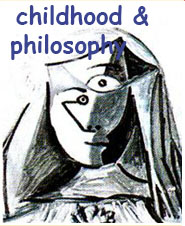listening to adults about childhood protection and children in homeless situation in urban brazil
DOI:
https://doi.org/10.12957/childphilo.2018.30572Keywords:
children in homeless situation, childhood protection, childhood.Abstract
This work is situated in the field of childhood studies, which conceives the child as an activesubject in society and who is, among other factors, marked by its generational position infront of other generations. In this opportunity, we reflect about how Brazilian kids who livein the urban space and in a very specific adversity context (the streets) are perceived. Theobjective was to understand how adults perceive those children in homeless situation, andhow do they face the duty of childhood protection once it is applied to those specificchildren. In order to do this, we present the results of two qualitative researches, separately developed by the authors, in three different cities in Brazil, from Northeastern andSoutheastern, counting on a total number of 77 adults. They participated throughindividual and group interviews. The registers of the fieldwork were analyzed andgenerated categories which deal with the question of who carries the responsibility overchildren in homeless situation, as well as the protection of marginalized childhood. Basedon the empirical work from two researches, we realized that the adults make adifferentiation between children who have the streets as their home and those who don’t.The participants elected the State as the major responsible for the children in homelesssituation. For this marginalized childhood, part of the adults elected governmentalinstitutions as the sole responsible for providing any kind of treatment to the children inhomeless situation, which not necessarily means a measure of protection. “Accountability”and “punishment” were much more often mentioned by the adults than “protection”. As aconclusion, we saw that the adults have not felt invited to protect marginalized childhood,since they primarily thought about their own protection and even went to a state of neglecttowards those children. The acknowledgement of the “pickpockets” was given only bynegative means, since the child in homeless situation was seen for some as an evil who actsdeliberately, so that this was the only moment when those children were regarded in anactive manner.Downloads
Download data is not yet available.
Downloads
Published
2017-12-19
Issue
Section
dossier



